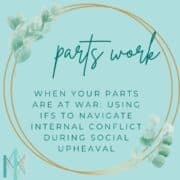
You wake up to news of another ICE raid in your community. Immediately, different parts of you spring into action: one part wants to drop everything and join the protest, another part reminds you of the work deadline that can’t be missed, while yet another part just wants to turn off the phone and hide under the covers. By noon, you’re exhausted from the internal battle—and nothing has even happened yet.
If this scenario feels familiar, you’re experiencing what many people face during times of social and political upheaval: internal parts that seem to be at war with each other, each with their own urgent agenda, each convinced they know what’s best for you.
Internal Family Systems (IFS) therapy offers a powerful framework for understanding and navigating these internal conflicts with compassion rather than judgment. Instead of seeing these competing voices as problems to eliminate, IFS helps us recognize them as different aspects of our psyche that developed to protect us and help us navigate complex situations.

Understanding Your Internal System
In IFS, we understand the mind as containing multiple “parts”—sub-personalities that developed over time to help us cope with life’s challenges. These parts aren’t signs of mental illness or fragmentation; they’re natural aspects of human psychology that become more apparent during times of stress or conflict.
Think of it like a internal boardroom where different executives have different priorities and strategies. During calm times, these executives might work together harmoniously. But during a crisis—like social upheaval, political threats, or community violence—they can start talking over each other, competing for control, and creating internal chaos.
The Three Types of Parts
IFS categorizes parts into three main types, each serving specific protective functions:
Exiles: These parts carry our deepest vulnerabilities, pain, and unmet needs. They hold our grief, fear, hope, and longing. During social upheaval, exiles might carry:
- Terror about safety for yourself or loved ones
- Grief for the injustices happening in your community
- Rage at systems that cause harm
- Deep longing for a world that feels safer and more just
- Childhood wounds related to powerlessness or abandonment
Managers: These parts work proactively to control situations and prevent pain before it happens. They’re often organized, responsible, and future-focused. During crises, manager parts might:
- Research every detail about upcoming protests to assess safety
- Create action plans for protecting your family
- Monitor news obsessively to stay informed
- Organize community response efforts
- Maintain work and family responsibilities despite the chaos
- Try to appear strong and capable for others who depend on you
Firefighters: These parts emerge when exiles break through despite managers’ efforts. They’re reactive and focused on immediate relief from pain. During social upheaval, firefighter parts might:
- Rage-post on social media without thinking through consequences
- Engage in risky protest behavior that managers would normally prevent
- Use substances to numb overwhelming feelings
- Completely withdraw from all news and community engagement
- Lash out at loved ones who are trying to help
- Make impulsive decisions like quitting jobs or ending relationships
When Parts Go to War
During times of social upheaval, these different types of parts can become locked in internal combat:
Manager vs. Exile Conflicts
Your manager parts might try to suppress exile parts that are feeling scared or overwhelmed. For example:
- A manager part insists “We need to stay strong and keep working” while an exile part is terrified and wants comfort
- A manager part focuses on “realistic” action steps while an exile part grieves what feels like insurmountable injustice
- A manager part tries to maintain normal routines while an exile part feels like the world is ending
Manager vs. Firefighter Battles
Manager and firefighter parts often have opposite strategies:
- A manager part wants to carefully plan protest safety while a firefighter part wants to storm the streets immediately
- A manager part tries to maintain professional composure while a firefighter part wants to scream at colleagues who seem oblivious
- A manager part focuses on self-care routines while a firefighter part insists that self-care is selfish during a crisis
Firefighter vs. Exile Dynamics
Sometimes firefighter parts emerge specifically to protect exile parts, but their methods can be counterproductive:
- A firefighter part numbs feelings to protect an exile that’s overwhelmed, but the numbing also blocks access to the exile’s important information
- A firefighter part becomes rageful to protect an exile that feels powerless, but the rage alienates potential allies
- A firefighter part withdraws completely to protect an exile that’s been hurt, but the withdrawal increases isolation
Common Internal Wars During Social Upheaval
The Activist vs. Self-Care War
- Activist part (often a manager): “People are suffering. We have to do something. Taking time for self-care is privileged and selfish.”
- Self-care part (could be manager or exile): “We’re burning out. We can’t help anyone if we’re depleted. We need rest and boundaries.”
- Internal battle: Guilt about resting vs. resentment about overcommitment, leading to ineffective action and poor self-care.
The Protector vs. Connector War
- Protector part (usually a manager): “The world is dangerous. We need to be vigilant and prepared. Trust no one.”
- Connector part (often an exile): “We need community and support. Isolation makes everything worse. We have to reach out.”
- Internal battle: Hypervigilance vs. longing for connection, leading to social anxiety and relationship strain.
The Fighter vs. Peaceful Warrior
- Fighter part (often a firefighter): “This is war. We need to meet aggression with aggression. Fight fire with fire.”
- Peaceful part (usually a manager): “Violence and aggression only create more harm. We have to be strategic and compassionate.”
- Internal battle: Rage seeking expression vs. values of nonviolence, leading to internal tension and ineffective action.
The Informed vs. Protected War
- Information part (typically a manager): “We need to stay informed. Ignorance is dangerous. Knowledge is power.”
- Protection part (could be manager or firefighter): “The news is traumatizing us. We need to limit exposure to protect our mental health.”
- Internal battle: Obsessive news consumption vs. protective withdrawal, leading to either overwhelm or dangerous disconnection.
The Role of Self in IFS
At the core of IFS is the concept of Self—not another part, but the essential center of who you are. Self has qualities like:
- Curiosity about different parts rather than judgment
- Compassion for all parts, even the difficult ones
- Clarity about values and priorities
- Courage to act from those values
- Calmness in the midst of internal and external chaos
- Connectedness to others and to something larger than yourself
- Creativity in finding solutions that honor multiple parts
When Self is in leadership, parts don’t need to war with each other because they trust that their concerns will be heard and their wisdom will be integrated into decisions.
Practicing Self-Leadership During Crisis
Step 1: Notice the Internal War
Instead of being caught in the battle, step back and observe it:
- “I notice I have a part that’s terrified about my safety and a part that insists I have to act now.”
- “There’s a part of me that wants to research everything and a part that wants to stop reading news entirely.”
- “I can feel different parts pulling me in different directions.”
Step 2: Get Curious About Each Part
Rather than judging parts or trying to eliminate them, develop curiosity:
- “What is my activist part really concerned about? What does it need?”
- “What is my self-care part trying to protect? What does it fear will happen?”
- “How old does this scared part feel? What does it remember about being powerless?”
Step 3: Thank Parts for Their Service
Every part developed for good reasons. Acknowledge their positive intentions:
- “Thank you, activist part, for caring so deeply about justice.”
- “Thank you, protector part, for trying to keep us safe.”
- “Thank you, scared part, for helping me recognize real danger.”
Step 4: Ask Parts to Share Their Wisdom
Instead of having parts fight for control, invite them to collaborate:
- “Activist part, what’s most important for you that I understand?”
- “Self-care part, what do you need me to know about our capacity right now?”
- “Scared part, what are you noticing that I should pay attention to?”
Step 5: Find Solutions That Honor Multiple Parts
From Self-leadership, look for creative solutions that address the concerns of different parts:
- “I can join the protest for two hours (honoring activist part) and then come home to rest (honoring self-care part).”
- “I can check news twice a day for 15 minutes (honoring information part) and then practice grounding exercises (honoring protection part).”
- “I can express my values through art (honoring creative part) rather than arguing on social media (protecting relationship part).”
Working with Specific Internal Conflicts
When Your Activist and Self-Care Parts Are Fighting
Listen to the activist part: What injustice is it responding to? What values is it trying to uphold? What actions feel most important?
Listen to the self-care part: What signs of depletion is it noticing? What kind of restoration does it need? What boundaries would help?
Self-led integration: Find ways to engage in activism that are sustainable. This might mean choosing one cause to focus on deeply rather than trying to address everything, setting time limits on news consumption, or finding forms of activism that feel nourishing rather than depleting.
When Your Protector and Connector Parts Are in Conflict
Listen to the protector part: What specific threats is it concerned about? What safety measures would help it relax? What past experiences is it remembering?
Listen to the connector part: What kind of support does it need? What relationships feel safe and nourishing? How does isolation affect your well-being?
Self-led integration: Create connections within appropriate safety parameters. This might mean joining affinity groups with others who share your experiences, engaging in mutual aid within trusted networks, or finding online communities when in-person gathering feels unsafe.
When Your Fighter and Peaceful Parts Are at War
Listen to the fighter part: What injustice is triggering this response? What does it want to protect or defend? What would “winning” look like?
Listen to the peaceful part: What values is it trying to preserve? What consequences is it worried about? What kind of world is it trying to create?
Self-led integration: Find forms of resistance that feel both powerful and aligned with your values. This might mean channeling fighter energy into legal advocacy, using peaceful part wisdom to build coalitions, or finding ways to confront injustice that don’t compromise your integrity.
When Parts Need Professional Support
Sometimes internal conflicts become so intense that professional help is needed. Consider seeking therapy when:
- Parts feel completely stuck in opposition with no possibility of collaboration
- Internal battles are significantly impacting your ability to function in daily life
- Parts are engaging in behaviors that feel dangerous or self-destructive
- You feel completely disconnected from Self and can’t access curiosity or compassion for your parts
- Trauma responses are being triggered that feel too overwhelming to manage alone
IFS Therapy for Social Upheaval
An IFS-trained therapist can help you:
- Identify your specific parts and understand their unique roles and concerns during crisis times
- Develop Self-leadership skills so you can mediate between parts rather than being controlled by them
- Address trauma that might be causing parts to become extreme or stuck in protective patterns
- Practice internal dialogue techniques for communicating with and between parts
- Create internal agreements about how parts can work together during ongoing social stress
- Process grief and loss that parts might be carrying about the state of the world
- Develop sustainable activism practices that honor both your values and your well-being
Building Internal Solidarity
Just as external social movements benefit from solidarity across differences, your internal system functions best when parts can work together despite their different perspectives and strategies.
Internal solidarity doesn’t mean all parts always agree. It means:
- All parts feel heard and valued
- Parts trust that Self will consider their concerns in decision-making
- Parts are willing to compromise when necessary for the good of the whole system
- Parts support each other even when they have different approaches
- The system can respond flexibly to changing circumstances
During times of social upheaval, this internal solidarity becomes a source of resilience and effectiveness. When your parts are working together rather than fighting each other, you have more energy available for the external work that matters to you.
Your internal conflicts during social upheaval aren’t signs of weakness or confusion—they’re signs of a complex, caring psyche trying to navigate an genuinely difficult world. By learning to lead your internal system with curiosity and compassion, you can transform internal wars into internal wisdom, creating space for more effective and sustainable engagement with the challenges facing our communities.
If you’re interested in exploring IFS therapy to help navigate internal conflicts during challenging times, browse our directory to find IFS-trained therapists in the Bay Area.





